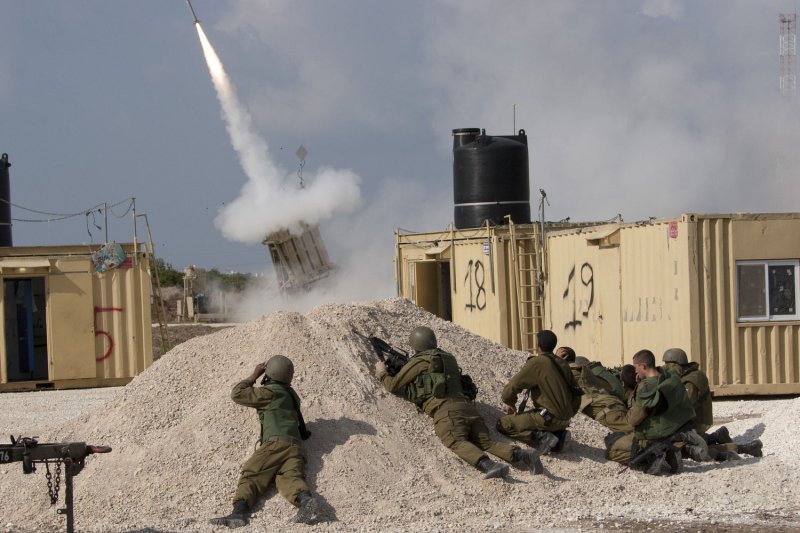Israeli soldiers take cover as they fire an Iron Dome intercept rocket in southern Israel as Hamas fires rockets into Israel from the Gaza Strip on November 19, 2012. UPI/Mati Milstein |
License Photo
TEL AVIV, Israel, April 23 (UPI) -- The Pentagon has stepped up efforts to fund Israel's anti-missile shield with the Missile Defense Agency requesting $220 million in fiscal 2014 for Israel's air force to buy more Iron Dome batteries.
It's the first time the MDA has specifically sought funds for Iron Dome, developed and built by Haifa's Rafael Advanced Defense Systems, in its annual budget process.
That underlines the U.S. Defense Department's effort to maintain military aid for Israel despite major cutbacks in defense spending.
The agency is also expected to seek another $520 million to fund other Israeli anti-missile systems, including the David's Sling and the high-altitude Arrow 3, which is under development.
"The money, if approved, would be on top of the $486 million the White House and Congress have requested or added for Iron Dome in recent years after formal budgets were submitted," The Jerusalem Post reported.
The House of Representatives and the Senate indicated in 2012 "they wanted to approve spending as much as $680 million for Iron Dome through 2015."
Iron Dome, designed to shoot down short-range missiles and rockets and recently upgraded to counter longer-range weapons as well, became operational in early 2012. But the Israeli air force, which has responsibility for air defense, has only acquired five batteries, several of those with direct U.S. funding on top of the annual $3.1 billion in U.S. military aid Israel receives.
That allowed Israel to deploy all five batteries during an eight-day November clash with Palestinian militants in the Gaza Strip.
By official count, Iron Dome successfully intercepted 84.6 percent of the rockets it engaged, including several that for the first time targeted Tel Aviv and Jerusalem. Iron Dome's Tamir interceptors engage only those projectiles its computer calculates will hit populated areas and ignores the rest.
Several missile scientists and others have questioned the system's kill rate, with one saying it was closer to 5-10 percent of rockets engaged than the government's assessment of 84.6 percent.
The government rejected the criticisms and is moving ahead with creating a multilayered defense shield against a sustained bombardment it fears by Iran, Lebanon's Hezbollah on Israel's northern border and Palestinian militants in the south.
David's Sling, being developed by Rafael and the Raytheon Co. of the United States, is designed to counter medium-range missiles.
Arrow 3, being developed by state-owned Israel Aerospace Industries and the Boeing Co., is intended to intercept Iranian and Syrian ballistic missiles outside Earth's atmosphere. In its first flight test a few weeks ago Arrow 3 achieved an altitude of 70 miles and intercepted a simulated missile threat.
The Arrow 2 variant currently in service will backstop at lower altitudes against ballistic attacks.
The fiscal 2014 request by the MDA includes funding for further Arrow 3 testing and a second interception flight before preparations begin for initial production.
There is separate funding for an Arrow "Weapons Systems Improvement" program that integrates data links between Israeli missile forces and U.S. weapons systems in the Middle East, reinforcing protection for the Jewish state.
MDA's funding efforts underline that the U.S. administration is seeking to ensure that U.S. military aid to Israel won't be affected by the so-called sequestration of U.S. defense spending.
The Congressional Research Service figures show that U.S. aid to Israel has increased since 1949 by an average of 28 percent a year, leaping 11.4 percent from 2010-13.
The Israel lobby in Washington is pressing for exempting Israel from automatic spending cuts being introduced in virtually all other U.S. government programs.
The commitment of U.S. President Barack Obama's administration to maintaining aid flow to Israel was also underlined by the Pentagon announcement last week that Israel, along with Saudi Arabia and the United Arab Emirates, will be receiving advanced weapons systems worth $10 billion over the next few years.
U.S. Defense Secretary Chuck Hagel stressed during his visit to Israel this week that military aid won't be cut.
Antiwar.com, a U.S. website that's highly critical of the levels of U.S. military aid to Israel, recently cited a report on Israeli government expenditures that showed the Jewish state spends "a hugely disproportionate amount on its military, with roughly one-fifth of the overall national budget going straight into military spending."















